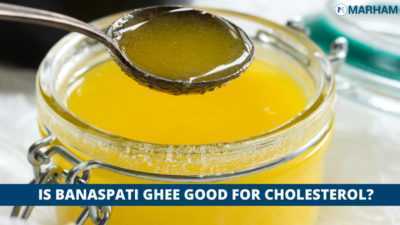Ghee is commonly used in many Pakistani households, and it is sold in markets and made at home. There is an ongoing debate about the link between banaspati ghee and cholesterol levels.
Some studies reveal positive results, while others discourage its use. But, what’s the truth? Is banaspati ghee safe for people with high cholesterol? Let’s find out in this health blog.
Vanaspati Ghee vs Desi Ghee
Desi ghee is pure and unadulterated cow ghee prepared through a traditional procedure of churning buttermilk. It contains animal fat but not artificial fat like vanaspati ghee because it is made from cow’s milk.


Vanaspati is a hydrogenated and hardened desi vegetable ghee. It is substantially less expensive than desi ghee and is manufactured from palm or palm olein oil. Hydrogenation is achieved by employing nickel as a catalyst in reactors operating at low to medium pressure. Trans fats are also present in vanaspati ghee.
Ghee Cholesterol Content
Before finding out the link between banaspati ghee and cholesterol levels, you should check its nutrition facts. One tablespoon (15 g) of Ghee or clarified butter has:
- Calories: 135
- Total Fat: 19%
- Saturated Fat: 45% (9 g)
- Cholesterol: 15% (45 mg)
- Carbohydrates: 0
- Proteins: 0
Cholesterol in Ghee vs. Butter


The cholesterol levels in both ghee and butter are pretty similar, so you can choose either. However, you must use only little amounts of ghee or butter if you have high cholesterol levels.
On the other hand, if you’re solely concerned about calories and fat, it doesn’t matter whether you use ghee or butter because they offer almost the same amount of calories.
Desi Ghee and Heart Health
Heart patients, you take extra precautions while selecting foods for their diet because there can be severe consequences. For thousands of years, desi ghee has been used as a healing agent in Ayurveda in Asian countries.
According to research, it is usually linked to an increase in the prevalence of heart disease due to its high amount of saturated fatty acids and cholesterol. But, at the same time, there are many benefits of desi ghee for health as well. So, let’s look at the pros and cons of desi ghee:
Benefits of Desi Ghee
- Monounsaturated Fats and Omega-3 Fatty Acids: Desi ghee has natural unsaturated fats that are beneficial and help to maintain a healthy heart and circulatory system.
- Lower Cholesterol levels: Ghee, when consumed as part of a well-balanced diet, has been shown in studies to help lower harmful cholesterol levels.
- No Trans Fats: Desi ghee is a better choice as compared to banaspati ghee for heart patients because it does not have trans fats.
- Fat-soluble Vitamins: It has vitamins A, D, E, and K, as well as natural fatty acids, which are excellent for overall wellbeing
- Safe for Cooking: Desi ghee has a high smoke point (250 degrees Celsius), making it a safer cooking alternative.
- Helpful for Weight Loss: It is an excellent choice for those trying to lose weight since it aids in weight loss if taken in small amounts.
- Long Shelf-life: It is easy to store and may be kept for up to 18 months without refrigeration.
Also, read the 10 Desi Ghee Benefits for Health
Side Effects of Desi Ghee
- Indigestion or Diarrhea: Excess ghee consumption might result in indigestion and diarrhea. Because it is a high-calorie food that might not be easily digested by your body.
- Cough: Desi Ghee might aggravate the symptoms of your cough and make the condition worse. Therefore, if you have a cough and a cold, you should avoid consuming.
- Risk of Heart Disease: While ghee can help lessen the risk of heart disease when consumed in moderation, too much-saturated fat might raise the risk. If you have additional risk factors for heart disease should use caution while including ghee in your diet.
- Overweight and Obesity: While some studies show that desi ghee can help in weight loss, it is still a calorie-dense and high-fat food. Therefore, if you consume too much desi ghee on a daily basis, it can lead to excess weight gain.
Consult a Heart Specialist!


If you think that you are at risk of developing heart disease due to high cholesterol levels, it is highly recommended to consult a heart specialist. A cardiologist can help you detect any problems at the early stages and start treatment. So, don’t compromise on your health. Click here to book your appointment online with the Best Cardiologists in Lahore through Marham.
Can’t Find the App?
| Android | IOS |
|---|---|
  |
  |
FAQs
1. Is ghee OK for high cholesterol?
You should use ghee in little to moderate amounts if you have high cholesterol levels or heart disease because it has a high-fat content.
2. Is vanaspati ghee bad for health?
Vanaspati ghee can be bad for your health if you are consuming high quantities of it every day. It can especially be harmful if you are a heart patient.
3. Is vegetable ghee good for cholesterol?
People with high cholesterol levels are recommended to use cooking oils like extra virgin olive oil and should avoid having vegetable ghee.

